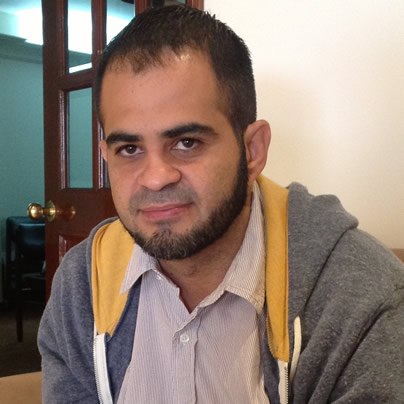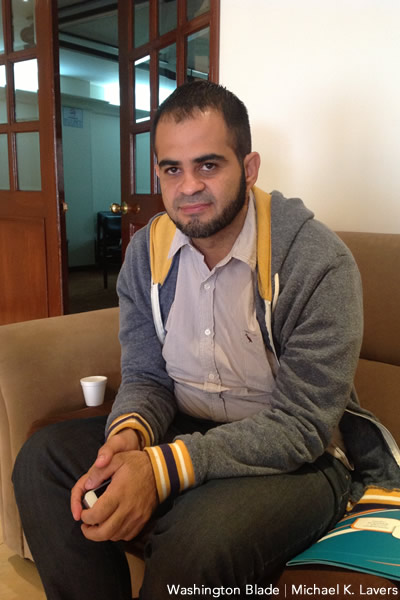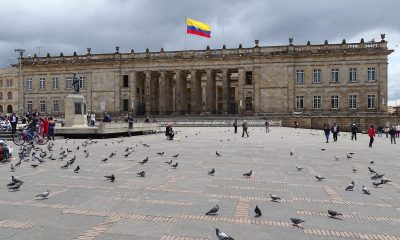World
30 Colombian LGBT activists attend training
Four day gathering is first of its kind in South American country


Wilson Castañeda of the Colombian LBGT advocacy group Caribe Afirmativo. (Washington Blade photo by Michael K. Lavers)
BOGOTÁ, Colombia — Roughly 30 activists from across Colombia attended a four-day training in the Colombian capital from May 30-June 2 designed to encourage LGBT people to become more involved in the country’s political process.
The program, which was coordinated by the Gay and Lesbian Victory Institute and the Astraea Lesbian Foundation for Justice, was the first to take place as part of the USAID-backed LGBT Global Development Partnership that will contribute $11 million over the next four years to advocacy groups in neighboring Ecuador and other developing countries.
Out Bogotá City Councilwoman Angélica Lozano Correa and Blanca Durán Hernández, mayor of the Colombian capital’s Chapinero district that has a large gay population, are among those who took part. They and others advocates from Colombia and the United States spoke about a variety of topics that ranged from campaigning as an openly LGBT candidate to fundraising and responding to opponents.
Lozano, Durán, Victory Institute President Chuck Wolfe, Francisco Herrero of the National Democratic Institute and Tatiana Piñeros, a transgender woman whom Bogotá Mayor Gustavo Petro in 2012 appointed to run the city’s social welfare agency, also took part in a May 30 panel on how out political leaders and officials can advance the Colombian and American LGBT rights movements. Marcela Sánchez, executive director of Colombia Diversa, a nationwide LGBT advocacy group, moderated this event that took place at a Chapinero hotel.
“We recognize the importance of strengthening capacities for those who want to become involved,” Sánchez told the Blade after the panel. “This is why we entered this alliance with the Victory Institute.”
The training, which is the first of its kind in the South American country, took place less than a month before gay Colombians can begin to legally register their partnerships.
Colombia’s Constitutional Court in 2011 ruled the country’s lawmakers have to extend the same benefits that heterosexuals receive through marriage to same-sex couples within two years. The tribunal’s deadline is June 20, but the Colombian Senate in April overwhelmingly rejected a bill that would have extended marriage rights to gays and lesbians in the South American country.
The court in 2009 ruled same-sex couples who live together must receive the same rights Colombian law affords to unmarried heterosexual couples. It also overturned the ban on openly gay soldiers in a separate ruling it issued the same year.
Colombia’s non-discrimination law that includes sexual orientation took effect in 2011.
Federíco Ruíz Mora of the Santamaría Fundación, a Cali-based group that advocates on behalf of trans Colombians, told the Washington Blade in April while he was in D.C. on a State Department-sponsored trip that he and other activists plan to seek legal protections based on gender identity and expression.
A report from the Latin American and Caribbean Network of Transgender Women (REDLACTRANS) notes 61 trans women in Colombia have been reported murdered between 2005-2011. A separate report that Colombia Diversa released last month indicates 58 of the reported 280 LGBT Colombians who were murdered between 2011-2012 were killed because of their sexual orientation or gender identity and expression.
Wilson Castañeda Castro, director of Caribe Afirmativo, an advocacy group that works in Barranquilla and other cities along the country’s Caribbean coast, told the Blade on Friday that police violence against LGBT Colombians remains a serious problem. Lozano said in a separate interview she hopes those who targeted, tortured and killed LGBT Colombians during the country’s armed conflict that began in the 1960s are held accountable in any peace settlement that could emerge from talks between the government and members of the Revolutionary Armed Forces of Colombia (or FARC in Spanish) that continue to take place in Cuba.
Participants: Political involvement helps advance LGBT rights
Those who took part in the Bogotá training said it will help LGBT Colombians become more involved in their country’s political process as the movement grows stronger and more visible.
“One of the ways to make further advance our rights as an LGBT community is to win political office,” Durán told the Blade on Saturday. “To have groups of people learn about tools, to have the skills to conduct these campaigns to me is very important.”
Lozano admitted she was a bit surprised that such a program took place in Colombia, but she described it as “positive.”
“It is incredible to me that programs like this exist,” she said.
Castañeda noted his organization, like Colombia Diversa, is non-partisan. He agreed with Durán that it remains crucial for LGBT Colombians to become involved in the country’s political process.
“We become involved in every election to present the LGBT agenda to candidates,” Castañeda said.

The Mexican Senate on Thursday approved a bill that would ban so-called conversion therapy in the country.
Yaaj México, a Mexican LGBTQ rights group, on X noted the measure passed by a 77-4 vote margin with 15 abstentions. The Chamber of Deputies, the lower house of Mexico’s congress, approved the bill last month that, among other things, would subject conversion therapy practitioners to between two and six years in prison and fines.
The Senate on its X account described conversion therapy as “practices that have incentivized the violation of human rights of the LGBTTTIQ+ community.”
“The Senate moved (to) sanction therapies that impede or annul a person’s orientation or gender identity,” it said. “There are aggravating factors when the practices are done to minors, older adults and people with disabilities.”
Mexico City and the states of Oaxaca, Quintana Roo, Jalisco and Sonora are among the Mexican jurisdictions that have banned the discredited practice.
The Senate in 2022 passed a conversion therapy ban bill, but the House of Deputies did not approve it. It is not immediately clear whether President Andrés Manuel López Obrador supports the ban.
Canada, Brazil, Belgium, Germany, France, and New Zealand are among the countries that ban conversion therapy. Virginia, California, and D.C. are among the U.S. jurisdictions that prohibit the practice for minors.
South America
Argentina government dismisses transgender public sector employees
Country’s Trans Labor Quota Law enacted in 2021

Protests have broken out across Argentina in recent weeks after the dismissal of transgender people from their government jobs.
President Javier Milei’s action is in stark contract with the progress seen in 2023, where the government’s hiring of trans people increased by 900 percent within the framework of the Trans Labor Quota Law that had been in place since 2021.
Among those affected is Sofia Diaz, a “survivor” who shared her testimony with the Washington Blade hours after she traveled from Chaco Province to Buenos Aires to protest her dismissal.
Presentes, an LGBTQ news agency, reported the government dismissed more than 85 trans employees in less than two weeks.
Diaz, 49, holds a degree in combined arts. She joined the National Social Security Administration (ANSES) in 2022 under the Trans Labor Inclusion Law. The layoffs began in January and left many people feeling uncertain and anguished. It was her turn a few days ago.
Diaz in an interview recounted how the situation became progressively more complicated, with difficulties in accessing information about her employment status and the eventual confirmation of dismissals through WhatsApp messages. This government action, according to Diaz, violates the law.
“We were on a Friday, I think on March 24, in the office and we have a WhatsApp group of other colleagues from all over Argentina who entered through the trans labor quota and they tell us if we can get our pay stubs on the intranet,” Diaz recalled. “So, I tried to enter, I could not, I talked to two other colleagues and they told me no, they could not, and so we went to another person. He couldn’t either.”
“Some people told us that it could be a system error. Well, we were never calm, let’s say not how this issue of installing fear and the perversion with which they do it ends,” she added. “This sadism of … inflicting pain and speculating with your misfortune and so on … is something that characterizes Javier Milei’s government.”
Diaz recalled a list of those dismissed from the agency began to circulate from the union in the afternoon. A colleague passed it on to her, “and well, unfortunately I was also on that list.”
“At that moment the whole weekend went by with anguish, crying, and talking with other colleagues from other places, not only trans, but everyone, everyone and everyone,” she said. “On Monday when we went to try to enter, we could not enter with the biometric, which is the thumb we had to use every morning to enter.”
Despite the difficult moment through which she is going, the trans activist stressed to the Blade that she will continue protesting and will even sue the government because her dismissal is illegal and “violates the constitution itself.”
The LGBTQ community and its allies have mobilized and organized demonstrations, highlighting the importance of defending the rights won and fighting against discrimination and exclusion. Diaz emphasized the fight is not only for the people affected today, but also for future generations, saying the historical memory of the struggles for inclusion and social justice must be kept alive.
“The Argentine government thus faces a key challenge in human and labor rights, where public pressure and social mobilization can play a determining role in protecting the rights of LGBTQ+ people,” Diaz said.
Africa
For queer Nigerians, being on gay dating apps is still a risk
Homophobes target users for violence

Gay hookup apps like Grindr, and dating apps like Tinder and Bumble have managed to proliferate queer communities in countries like Nigeria.
Those who seek one night stands find what they want while those looking for love equally find what they seek. These platforms have managed to position themselves as safe spaces for queer people in anti-gay Nigeria. In recent times, however, it is proving to be unsafe, as homophobic people are quickly learning about the apps, and opening accounts that either seek to outrightly threaten queer people, or pretend to be queer, have long chats with gay people, invite them over, and inflict violence on them.
Take the case of Biodun, a queer Nigerian man who joined Grindr to meet up with guys like him.
After Biodun had built a connection and agreed to meet with someone whose display name was “Mamba,” they decided to meet up only for him to be met with violence. Apparently, Mamba ran a catfish account.
“I’ll never forget that day,” Biodun, who asked the Washington Blade not to use his last name because of safety concerns, said. “I still think about it, and sometimes blame myself for being very careless, even though Grindr was supposed to be our safe space.”
Biodun’s experience isn’t peculiar to him.
In Nigeria, draconian laws that criminalize same-sex relationships exist, making queer people turn to the digital realm to explore their identities and seek connections beyond the confines of societal oppression that comes with the physical environment. Gay dating apps such as Grindr, therefore, have emerged as virtual sanctuaries, offering spaces for queer Nigerians to forge friendships, find solidarity, and pursue romantic or sexual relationships. Spaces like this, however, have morphed into a landscape fraught with danger, as homophobic people have weaponized these platforms to perpetuate hate and violence.
“Sometimes, I often wonder how they learned about these platforms,” Daniel, which is not his real name, told the Blade. “You would think that it is just us in the platforms, until you find out that the accounts are rooted in homophobia.”
One time, someone’s bio read, “I’m only here to deal with the gay people. I know all of you, and I will find and kill you. We no want una for here (translates to we do not want you here, in English.)” It was a stark reminder that these spaces are no longer LGBTQ-friendly for Nigerians. In 2014, there was the passage of the Same-Sex Marriage Prohibition Act by former President Goodluck Jonathan, which not only criminalized same-sex unions, but also imposed severe penalties on anyone involved in LGBTQ advocacy or support.
This law catalyzed a surge in discrimination and violence against queer Nigerians; emboldening regular civilians, religious extremists, and even law enforcement agencies to target individuals perceived as deviating from traditional gender and sexual norms. Again, amid this hostile environment, gay dating apps emerged as lifelines for many queer Nigerians, offering avenues for discreet communication, community building, and the pursuit of intimate relationships.
The very anonymity and freedom these apps provided, however, became double-edged swords.
The advent of screenshot and screen-recording capabilities on these apps, for example, reduced the risks of exposure, strengthening the safety and privacy of users. However, this also comes with its own lapses, as queer people using Grindr have often relied on screenshots and screen recordings to confirm the identities of potentials with their friends, before accepting to meet.
“Before the removal of the screenshot option, I usually shared photos of others with my trusted friends,” Biodun shared. “But since that was taken off, there was no way for me to do that.”
Although, according to Grindr’s terms and conditions, the removal came with privacy concerns, as it was to facilitate a safe dating experience.
This erosion of digital safe spaces is depriving queer Nigerians of vital avenues for self-expression and affirmation,and is exacerbating the psychological toll of living in a society that continues to systematically demonize their identities. Moreover, the normalization of homophobic rhetoric and violence in both physical and digital realms has perpetuated a cycle of fear and oppression, and is reinforcing this notion that LGBTQ individuals are inherently unworthy of dignity and respect. Despite these challenges, though, the resilience of queer Nigerians continue to persist, as they defy societal norms and assert their right to love and be loved.
-

 State Department4 days ago
State Department4 days agoState Department releases annual human rights report
-

 District of Columbia2 days ago
District of Columbia2 days agoCatching up with the asexuals and aromantics of D.C.
-

 South America2 days ago
South America2 days agoArgentina government dismisses transgender public sector employees
-

 Politics5 days ago
Politics5 days agoSmithsonian staff concerned about future of LGBTQ programming amid GOP scrutiny












